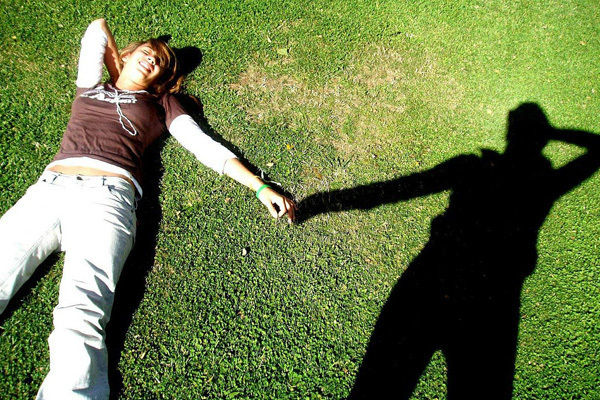
Larry Drain of the Hopeworks Community blog wrote an excellent post on three things we can do about our moods: prevention, coping, learning. He writes “Moods are processes–not event. They have a coming and a going.” Like mindfulness specialist Elisha Goldstein, he reminds us of our mood’s impermanence … that they don’t have stick if we can learn how to cook them and our thoughts with Teflon (preferably the non-cancer-causing kind).
Even though I know, on some level, that moods are temporary and transient, it was helpful to remind myself of three proactive ways I can, much like my adorable golden-chow mutts, take their leashes into my hands, grab the poop bag, and regain control. Larry writes:
Depending on where you are with the mood there are basically 3 things you can do:
Prevention
Prevention is the set of skills that have to do with how you maintain positive momentum and redirect negative momentum. It includes things like: self maintanence (what you do to take care of yourself), knowing high risk situations and warning signs (being able to “see it coming”), and cues (knowing exactly what you do that tells you exactly how you are doing- for ex. on the manic scale an 8 means what?). Finally it means those plans that you are going to follow once you “see it coming.” Prevention means becoming an expert on yourself with some degree of efficiency and expertise.
Coping
Coping is what you do when you know “its here.” It means limiting the damage and beginning the process of positive momentum. A lot of coping is tied up with how you process your experience and the plans you have for support when you can no longer trust the way you process your experience. It means knowing that because something “feels so” doesnt make it so. It means having a sounding board- whether it is a script or series of statements you do or another person you can trust- that helps to clarify reality when it doesnt seem so clear. It is trying so hard not to leap and find yourself dealing with consequences of your mood that you really don’t want to see happen.
Learning
Learning has to do with how you view the “finished product” and what you learn that you can use next time. It means seeing mistakes and also seeing successes. It means viewing your experience not just as a source of deprivation, but as a possible opportunity to learn more about life.
In the three years since my last hospitalization I think I am getting better at prevention of mood crises. I no longer wait until day five of a depression to put on my detective hat and figure out what in that last few weeks may have triggered a deterioration of mood.
I am constantly making connections between my diet, exercise regime, and sleep schedule with my mood. For example, the first day I wake up with that familiar dread (“How will I make it through this day?”), I look for clues in the notes I’ve made in my journal during the last month. Usually I will find something like a two-day sugar binge brought on by one of my kids’ birthdays (“Maggie Moo’s ice-cream birthday cakes, in particular), or irregular sleeping (even a half-hour off of my normal bedtime and wake time can alter my mood), not enough time to myself, skipping my 15 minutes of prayer and meditation in the morning, or a dangerous Internet craze, like, say, seeing how many new people I can follow on Twitter in one hour. Answer: 750.
However, sometimes, despite my best efforts at prevention, I still land in the Black Hole. I’m especially vulnerable to stress caused by problems and complication in my kids’ lives, and regrettably I can’t control that … at least not completely. So I have to just deal with my mood, as ugly it is, by doing just as Larry suggested: First I treat the collateral damage. I pick up the messes in whatever way I can. Then I try like hell to shift the momentum.
I especially love this wisdom of Larry’s: A lot of coping is tied up with how you process your experience and the plans you have for support when you can no longer trust the way you process your experience. It means knowing that because something “feels so” doesn’t make it so.
And learning? Yes, all that is done in hindsight, even though sometimes I have to make the same damn mistake 238 times for my brain to recognize that a certain behavior of mine does not render good results … like maybe to learn from my manic week of Facebook, when I friended 350 people I didn’t know, … that doing the same in Twitter could very well contribute a similar consequence.
On my good days, I can, as Larry says, celebrate (more like … accept) my mistakes as plentiful “opportunities” for growth.
* Click here to subscribe to Beyond Blue! And click here to follow Therese on Twitter. And click here to join Group Beyond Blue, a depression support group. Now stop clicking.

